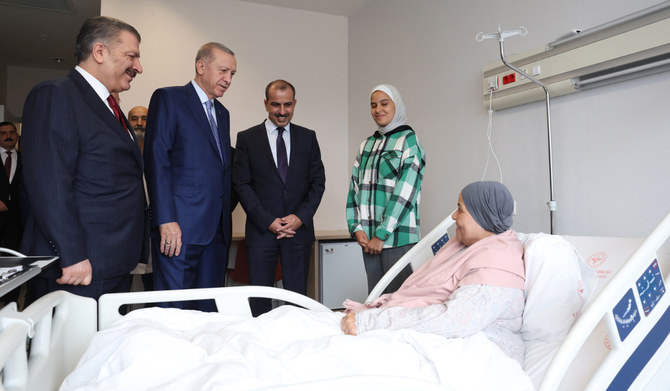ANKARA: Following Israeli security chief Ronen Bar’s pledge to pursue Hamas leaders overseas, all eyes are now on Turkiye to gauge whether this development will further escalate tension in relations between the two countries.
In a recording released by Israel’s public broadcaster Kan on Sunday, Bar, the head of Israel’s domestic security agency Shin Bet, stated that Israel intends to wipe out Hamas leaders in Qatar, Lebanon, and Turkiye.
“This is our Munich. It will take a few years, but we will be there to do it,” he remarked, alluding to the 1972 attack where Palestinian Black September gunmen killed 11 Israeli Olympic team members during the Munich games.
Israel subsequently carried out retaliatory operations against Black September operatives in different countries over a number of years.
BACKGROUND
Political analyst Gokhan Cinkara believes that Turkiye’s NATO membership and its significant regional power would discourage Israel from making concrete moves on Turkish soil.
The contents of the recording of Bar garnered disapproval in Ankara, with state-run Anadolu Agency reporting that Israeli authorities have been informed of the serious consequences that “illegal operations on Turkish territory would generate.”
The development comes against the trend of diplomatic reconciliation between Turkiye and Israel, based largely on the close collaboration between the intelligence agencies of both nations.
This cooperation successfully prevented several attacks targeting Israeli citizens in Turkiye.
Additionally, Turkiye disclosed that Israeli spy networks had operated in the country, gathering intelligence on resident Palestinians.
Turkiye reportedly requested that all Hamas political leaders leave the country on Oct. 7, following the attack by the group on Israel, although the Turkish presidency refuted this claim.
The Hamas officials who had been residing in Turkiye allegedly arrived there after the 2011 Gilad Shalit prisoner exchange.
Top Hamas officials, including Ismail Haniyeh, have also openly visited Turkiye and stayed in Istanbul over the years.
On Wednesday Turkish President Recep Tayyip Erdogan warned that Turkiye would not tolerate Israeli security operations on its soil and cautioned that it could severely impact bilateral relations.
“If Israel dares to take such a step on Turkish soil, it will pay such a great price that it will not be able to recover from it,” he said.
In recent days, Erdogan harshly criticized Israeli Prime Minister Benjamin Netanyahu and labeled him a “war criminal” and “the butcher of Gaza” — remarks that were quickly countered by Israeli Foreign Minister Eli Cohen, who directly addressed the English account of the Turkish presidency, and said: “You are welcome to host in your country Hamas terrorists who aren’t eliminated and flee from Gaza.”
Gokhan Cinkara, political analyst and founder of the Ankara Center for Global Politics, believes Turkiye’s ties with the Hamas leadership resulted from a foreign policy trend shaped during the Arab Spring.
“The success of Hamas in the 2006 Palestinian elections pushed many actors, especially the US, to communicate with them. However, subsequent developments, especially after the exclusion of Al-Fatah in Gaza and the loss of influence of the Arab Spring, led to their exclusion by regional actors,” he told Arab News.
Cinkara thinks that Turkiye’s NATO membership and its significant regional power would discourage Israel from making concrete moves on Turkish soil.
According to Betul Dogan-Akkas, assistant professor of international relations at the department of international relations at Ankara University, Turkish-Israeli ties have fluctuated for decades, and have never been immune from global or regional actors.
“Although Qatar and Turkiye are also mentioned in Bet’s statements, I don’t see this scenario as a realistic or preferable act for Israel. The weakest angle here is Lebanon. Neither Qatar nor Turkiye will keep their reaction low once an Israeli operation on their soil threatens their domestic security,” Dogan-Akkas told Arab News.
“Regarding the situation of Qatar, this could even destroy its mediatorship role and will just push it further into the Palestinian resistance,” she added.
“Regarding the case of Turkiye, we don’t have solid and public information about the names of leaders residing in Istanbul, yet it is a de facto situation that there are Hamas members or political elites from Hamas in Turkiye. These names are not from the military sphere as Turkiye’s partnership with Hamas is based on an ideological level rather than a practical military cooperation, as is the case with Iran,” Dogan-Akkas said.
Experts caution about the potential effect of any Israeli attack on the countries where Hamas members reside, which could turn the ongoing war into a regional conflict.
“This does not mean that these countries will quickly declare war on Israel, but this will destroy a rapid ceasefire or attempts to find a solution in Gaza,” Dogan-Akkas said.
However, it is still unclear what was the underlying intention behind Bar’s words and experts remain skeptical about whether Turkiye will change its policy on Hamas.
Cinkara does not expect any change in Turkiye’s relations with Hamas for the time being under current regional circumstances.
But for Dogan-Akkas, Bar’s words were a tactical move to show the world Israel’s intelligence superiority, especially as an answer to ongoing criticisms about failures over the Oct. 7 attack.
“They could take some Hamas hostages abroad, but this won’t be from Istanbul or Doha. In the meantime, I don’t think President Erdogan will completely deport Hamas-affiliated political figures because they are already low profile; they don’t go public except their small communities,” she said.


























